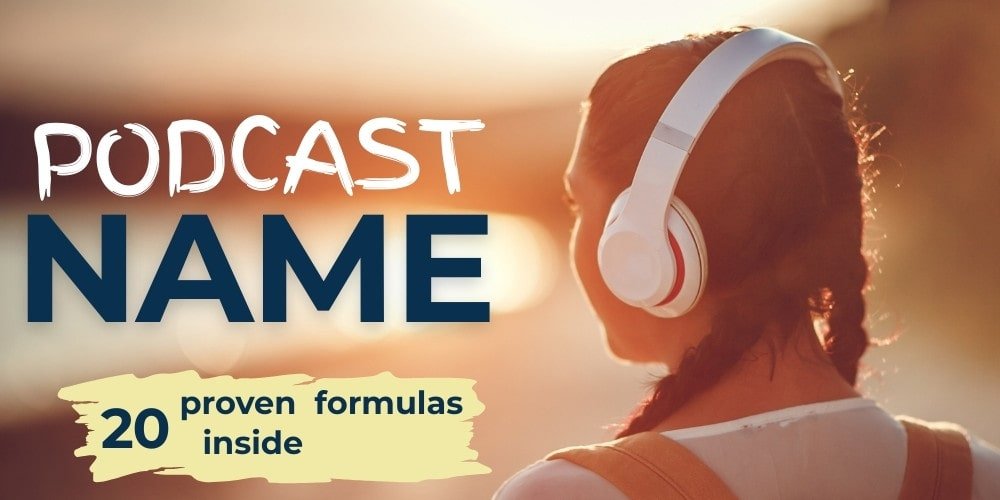I’ve watched too many podcasts with great potential die because of a terrible podcast name. You know these kinds of shows with brilliant content, passionate hosts, but with titles so confusing that potential listeners scroll right past them. Or even worse, you may have heard about a fantastic podcast from a friend, but when you want to search for it, you can’t remember the name or how to spell it.
Being careless when setting up your podcast’s foundation can be devastating. A confusing name often gets compounded by poor podcast equipment choices that make even great content hard to consume—essentially putting the final nail in the coffin.
Your podcast name isn’t just a label; it’s the first impression, the search term, and the thing people say out loud when they recommend your show. Get it wrong, and you’re fighting an uphill battle from day one.
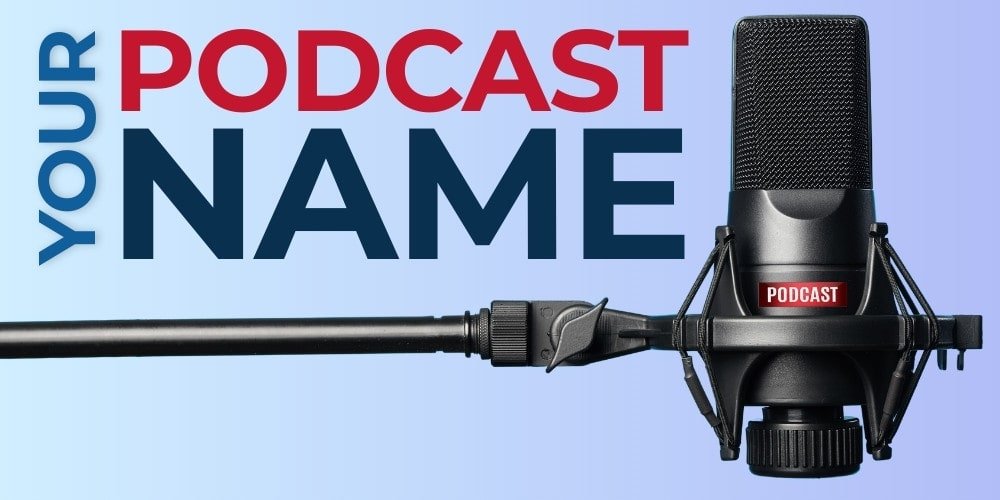
Table of Contents
- Quick-Start: How to Come Up with a Podcast Name (Fast Guide)
- Why Names Work (or Don’t): The Psychology of a Catchy Podcast Name
- Strategy vs. Style: Choosing the Right Naming Approach
- 20 Naming Formulas to Get Better Ideas
- Use SEO in Your Podcast Name
- What Not to Do: Podcast Naming Pitfalls
- Why Your Podcast Subtitle Matters
- Real World Quick Tests for Your Podcast Name
- Availability & Legal Check
- The Last 10-Minute Checklist
- AI Tools to Help You Brainstorm
- Secure Your Podcast Name Now
Quick-Start: How to Come Up with a Podcast Name (Fast Guide)
Don’t have time to read 3,000 words?
No problem. Here’s a quick-start guide that gives you a simple method to pick a strong, memorable name for your podcast that actually works.
The 3 Most Important Rules
Before you start brainstorming, keep these 3 rules in mind. They are key for a successful podcast title.
- Clarity Beats Cleverness. If a new listener can’t guess your show’s general topic, the title isn’t doing its job. Avoid obscure or inside-joke names that can hinder your discoverability. When in doubt, choose the clearer option.
- Easy to Say = Easy to Share. Your podcast will spread by word-of-mouth. If someone can’t easily recall, say, and spell your title after hearing it once, you’re losing potential listeners because they won’t be able to find it.
- Short and Sweet. Your podcast name must be short—ideally 2-4 words (under 30 characters)—and instantly readable in a small square thumbnail. If it gets truncated or is hard to scan at a glance, it’s failing the most critical test.
The Podcast Name Generation Workflow in a Nutshell
- Brainstorm 10+ ideas using topic-related keywords and creative variations, or jump-start the process with our AI podcast name generator.
- Shortlist 5+ names that are clear, catchy, and easy to say.
- Check availability (directory, domain, socials, trademark).
- Say them out loud — test with friends and see which ones stick in memory.
- Use our free podcast teleprompter to record yourself saying each option, then send those clips to friends to see which names are most memorable.
- Decide and commit — consistency across RSS, artwork, website, and socials boosts discoverability.
A Quick List of Winning Formulas for Naming Your Podcast
- Descriptive clarity: Freelance Pricing School
- Creative + Subtitle: Signal Shift: B2B Marketing & Positioning
- Curiosity-driven: Why Startups Fail
- Authority tone: Marketing Mechanics
Things to Avoid
- Overly long or vague names.
- Intentional misspellings or symbols (e.g. “Cr8tive Chat$”) that break recall and search.
- Keyword stuffing (“Podcast SEO Marketing Growth Strategy with John”).
- Adding “with [Host]” in the official Apple/Spotify title field (save it for metadata/artwork).
To sum up: Pick a short, clear, memorable name that signals your topic, then let the subtitle and description carry your keywords. Clarity always scales better than cleverness.

Why Names Work (or Don’t): The Psychology of a Catchy Podcast Name
The best podcast names aren’t trying to be too clever. Instead, they just make sense right away. Think about it: when someone mentions a show, can you actually remember what it’s called? Can you spell it without thinking twice?
Here’s the example I usually use: if your friend tells you about a podcast at lunch, will you be able to find it later, on your way home, when you’re browsing on your phone? If the name is confusing, too long, or hard to pronounce, you’ve already lost that potential listener. They’ll try to search for it, get frustrated, and move on to something else.
The names that stick are simple, easy to say, and tell you what the show is about right away.
Keep It Short and Simple
There’s a reason why the most successful podcasts have short, easy names. When someone can say and spell your title without thinking twice, they’re way more likely to remember it and tell their friends about it.
Have you noticed that show titles with just 3-4 words, like ‘This American Life’ or ‘How I Built This’, get shared and found much more often than podcasts with long, complicated names?
When someone tries to search for a show they heard about, they usually only remember the first few words anyway, so the name has to be short.
Why Some Names Just Sound Right
Ever notice how some podcast names just sound right? There’s actually something to that. The sounds in your name affect how people feel about your show before they even know what it’s about.
Names with softer sounds like ‘Stories’ or ‘Wandering’ feel warm and approachable. Meanwhile, names with harder sounds like ‘Tech Talk’ or ‘Sharp Focus’ come across as more serious and direct.
You don’t need to overthink this, but try saying your potential names out loud. Does the sound match what your show is actually like? A gentle, storytelling podcast probably shouldn’t sound like a business report, and vice versa.
Still, if you want to go deeper on how sound can make your podcast name more coherent and memorable, you can check out this research on sound symbolism and naming, which explores how the sounds within a name influence memorability, emotional response, and perceived meaning.
Make Them Curious (But Not Confused)
We’re talking pure gut reaction here—the instant feeling someone gets when they first hear your name.
People can’t resist a little bit of mystery. Names that make you think “Wait, what?” or “I need to know more about that” get way more clicks than boring ones.
Be honest; would you rather click on “Business Tips” or “Why Most Startups Fail (And How to Avoid It)”? The second one catches your attention, right? It makes you want to know more.
But here’s the catch: don’t be so mysterious that people have no clue what your show is about. A little intrigue gets them to click, but clarity is what makes them subscribe and stick around.
Words That Hit Different
We’re emotional creatures first, logical ones second. Words that hit you in the gut, like “confessions”, “untold”, or “unfiltered”, make titles way more memorable than boring corporate language.
Just make sure your emotional language actually matches your content. Nobody likes feeling tricked into clicking on something that doesn’t deliver what it promised.
Strategy vs. Style: Choosing the Right Naming Approach
There isn’t a standard and unique way to name your podcast. The right naming formula depends on what you need it to accomplish. Here’s a table summarising which style works best for each situation:
| Naming Move | Best For |
|---|---|
| Descriptive Clarity | New shows, education, niches with active search |
| Creative / Metaphorical | Storytelling, culture, concept-driven shows |
| Question-Based | Interviews, conversations, exploration formats |
| Alliteration | Business, news, expert-driven formats |
| Personal Names | Known hosts, personal brand building |
| Niche Insider | Professional/technical audiences with shared jargon |
| Format-First | Shows with unique structure or listening experience |
Here’s how each approach works:
Descriptive Clarity
This works best when you’re just starting out and need people to instantly understand what your show is about. The “Niche + Promise” formula, like in “Freelance Pricing School”, might sound a bit boring, but it is crystal clear, works like a charm for discoverability and Google loves it, especially when you haven’t made a name for yourself yet.
Creative or Metaphorical Titles
They are ideal for storytelling, podcasts about culture, or concept-driven shows. Titles like “99% Invisible” or “Entrepreneurs on Fire” are great for branding your show, but they usually need a clarifying subtitle so new listeners know exactly what they’re getting.
Question-Based Titles
They work great for interviews and conversations. They instantly tell listeners you’re exploring topics together rather than just delivering information. “How I Built This” nails this approach perfectly.
Alliteration
It makes titles more memorable because the repeated sounds are easier to remember. Compare “Marketing Made Simple” to “Simple Marketing” – the first one just rolls off the tongue and sticks with you.
Podcasts named after you
Personal names work best when you’re already known in your field or building a personal brand. If you’re going this route, make your name central, not something awkwardly added at the end. “The Tim Ferriss Show” is a better title than “Business conversations with Tim Ferriss”.
Niche Insider expressions
When your audience shares specific knowledge or terminology, use it. “Reply All” works for tech people, “Pod Save America” for political listeners. This type of titles only works if you’re truly serving that insider community.
Format-First Naming
If your format is what makes your show different, lead with it. “60-Second Science” or “5-Minute Friday” immediately set expectations about the listening experience.
If you are not sure about which title format you should use for your podcast, go for a creative main title that listeners want to say aloud; then add a subtitle that nails the niche and keywords. This balances artistry with discoverability.

20 Naming Formulas to Get Better Ideas
Use these podcast naming prompts to feed your brainstorming session:
- The [Topic] Lab – The food lab
- [Verb] the [Niche] – Master the market
- [Niche] Unfiltered – Podcasting unfiltered
- [Audience] Playbook – Investor playbook
- The [Outcome] Project – The Innovation Project
- [Niche] in Practice – Meditation in practice
- Beyond [Obvious Term] – Beyond the score
- [Niche] Field Notes – Creator field notes
- The [Pain Point] Fix – The relationship fix
- [Niche] Daily/Weekly/Brief – Sports daily
- [Verb] Better: [Niche] – Invest better
- [Niche] Backstage – Startup backstage
- Why [Niche] Works – Why SEO works
- [Niche] Mechanics – Marketing Mechanics
- [Niche] Made Simple – Science Made Simple
- [Niche] Stories – Startup success stories
- [Niche] Decisions – Career decisions
- [Niche] and [Adjacent Theme] – Food and culture
- [Niche] IQ – Leadership IQ
- [Niche] Conversations – Tech conversations
Use SEO in your podcast name, subtitle and descriptions – but do not overdo it
Good podcast SEO isn’t about stuffing keywords into every available space, but rather about creating a solid title, subtitle and description; and being strategic where to place a keyword or two. Just like choosing the right podcast software impacts your workflow, your naming strategy affects discoverability.
Start with your podcast name: work one primary keyword or clear category word into your main title or subtitle. Think “Podcast Growth Lab: Audience, SEO, and Monetization” rather than cramming multiple keywords together. Keep it natural and on-brand while still being discoverable.
For descriptions, mention your primary keyword naturally and include the terms your actual listeners use when searching. Your episode titles are perfect opportunities to target specific questions people ask. The key is keeping things clear and compelling, while avoiding mechanical repetition.
Don’t forget about YouTube if you want to do video podcasts. It’s becoming a major discovery platform, so your titles need to work visually too. If you’re planning video content, make sure your titles read well in thumbnails and complement your cover art.
Here’s where most podcasters go wrong: they try to chase every possible keyword, but focus builds real authority. When you consistently cover a topic area, search algorithms recognize your expertise, and that compounds over time, bringing more and more eyeballs to your podcast.
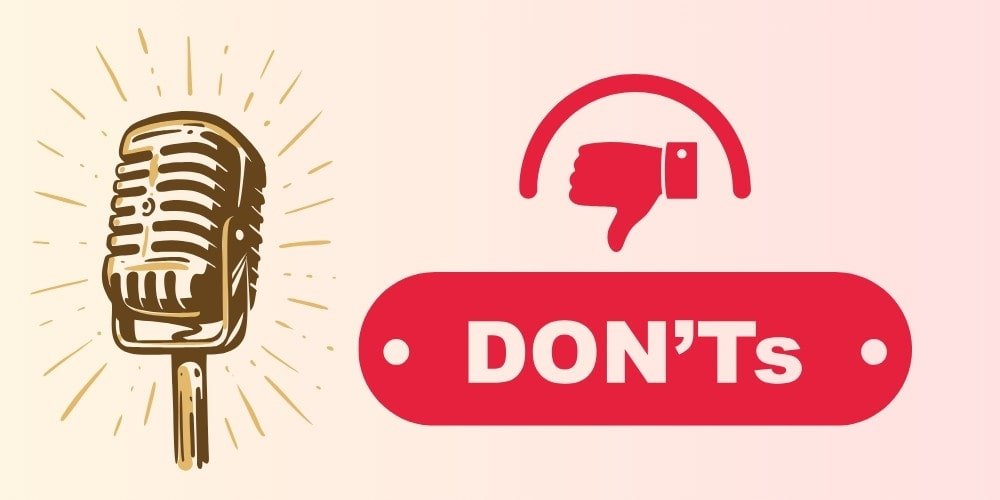
What Not to Do: Podcast Naming Pitfalls That Kill Discoverability
Avoid these common mistakes:
- Generic or vague titles that do not convey your specific topic, or inside jokes that only you understand
- Overly long names that get cut off on mobile devices and look unprofessional
- Forced misspellings or symbols like “Cr8tive” or “Pod@cast”, which make word-of-mouth recommendations harder and break search functionality
- Keyword stuffing in your podcast name or subtitle, which looks overly spammy
- Overly narrow topics that box you in as you grow (avoid trend-specific terms or year-based titles like “2025 Marketing Show”)
- Adding “with [Host Name]” to iTunes – it’s cleaner to integrate the host name naturally or keep it in the author field and artwork to avoid policy issues
- Misleading titles that don’t match your tone or content
Avoid these traps and you’re already ahead of most podcasters out there.
Why Your Podcast Subtitle Matters More Than You Think … and How to Get It Right
While your podcast name is more about your brand, your subtitle is the bridge between creativity and clarity. Your subtitle is the elevator pitch of your show and tells the world what your podcast is about.
How to write a solid subtitle? Start with your audience or topic, then deliver a specific promise or outcome. Keep it clean and avoid overly complex phrases and marketing buzzwords that make people’s eyes glaze over.
A simple formula would be something like this: place your primary keyword naturally into the first half of the subtitle (whether it’s “podcast marketing,” “lifting weights,” or whatever your niche is). This helps platforms categorize your content correctly while keeping it readable for actual humans. You want discoverability without looking spammy.
Real World Quick Tests for Your Podcast Name
I know you already have a strong candidate name for your podcast, but it’s good practice to go out of the lab and run some fast experiments to see whether the name can do as good as you think.
Here’s a list of quick tests you can run immediately:
- Would a stranger instantly understand the general topic?
- Can a friend remember and spell it after hearing it once?
- Does it look clean and legible on a 1:1 square at phone-screen size?
- Does it support the content you’ll make one year from now?
- Is there any obvious confusion risk with a larger brand or show?
If a podcast name fails these tests you’d better find another name.
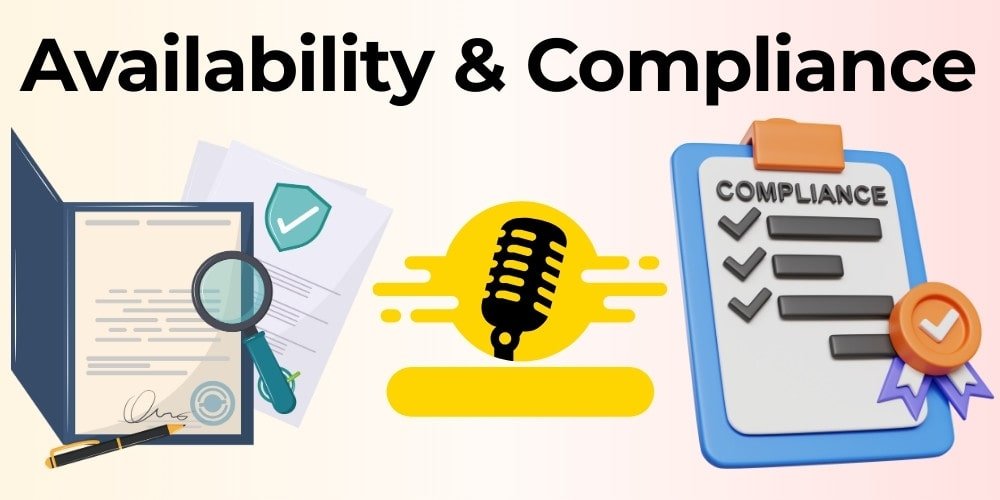
Availability & Legal Check: Protect Your Brand before You Launch
Nothing’s worse than launching your podcast, growing an audience, then discovering someone else already owns your name. Here’s how to avoid that nightmare:
Essential checks:
- Search podcast directories and platforms like Apple Podcasts, Spotify or Youtube for identical or similar titles.
- Run a USPTO trademark search for clear conflicts. Podcast marks typically fall under classes 9 and 41 for audio and entertainment services, but don’t stop there, as if part of the potential podcast name is trademarked, it won’t end well for you. For instance, “The Mario Bros cult” would be shut down in no time for a trademark violation.
- To rule out any potential trademark issue, consider consulting a professional trademark lawyer before fully committing to a name, especially for big shows or corporation-based podcasts.
- Finally, secure your website domain and the social media handles to maintain brand consistency. If the exact .com is unavailable, .fm or .show can work well for podcasts too. You can also add a simple modifier like “podcast” to the domain; but remember, avoid awkward spellings just to get a domain.
Don’t skip this step. A little bit of due diligence now prevents costly rebranding headaches later. Plan ahead, especially if you’re investing in professional artwork or marketing materials.
The last 10-Minute Checklist Before Publishing Your Podcast Name
Ready to launch? Run through this final checklist to make sure your podcast name will work as you want.
- Podcast name is between 2-4 words, if possible, and under 30 characters.
- Podcast name is easy to say and spell after hearing it just once.
- Podcast name and subtitle together is under 60 characters. Add just your main keyword at the beginning of your subtitle.
- Subtitle clarifies the podcast focus and includes the main keyword in a seamless way.
- No author name at the end of the podcast name. The author name should be central to the podcast name or just appear on the podcast art and author field (podcast submission).
- Directories/platforms, web domain, and social media handles availability checked.
- USPTO search for potential trademark conflicts.
- Works at a glance on small cover art (mobile friendly).
- Keep the name consistent across feed, artwork, website, and social media.
- Not trend-locked or year-stamped unless it’s a deliberate limited series. The podcast name should leave room for future expansion (at least 1-2 years of content).
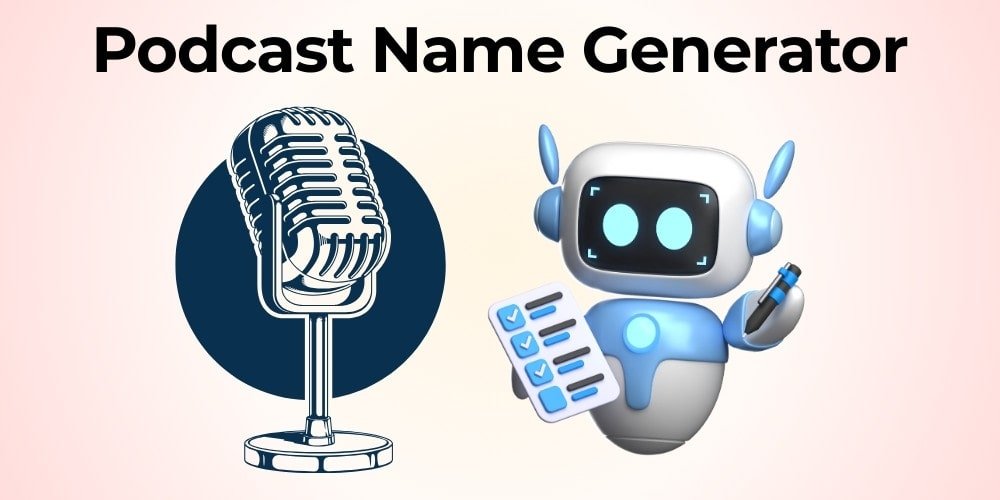
AI Tools to Help You Brainstorm Your Podcast Name
Why spend hours brainstorming when AI can generate dozens of strong name options in seconds? Modern AI tools like ChatGPT excel at creative pattern recognition and can help you explore naming possibilities you’d never think of on your own. Take advantage of this new technology.
Here’s a proven prompt you can use:
Generate 20 podcast names for [YOUR NICHE/TOPIC].
Follow these rules:
- 2-4 words maximum
- Clear what the show is about
- Easy to say and spell
- Memorable and brandable
- Mix these styles: descriptive clarity, question-based, alliteration, and creative metaphors
- Avoid generic words like “show,” “podcast,” “with [host]”
My niche: [INSERT YOUR TOPIC]
My audience: [INSERT TARGET AUDIENCE]
My tone: [professional/casual/educational/entertaining]
Format: Just list the 20 names, no explanations.
Don’t hesitate to tweak the prompt and run it more than once—sometimes your best ideas come in the second or third batch!
Do you want to skip the prompt and get results faster? Try our free AI-powered podcast name generator that creates dozens of brandable podcast names in seconds based on your niche, audience, and tone. It follows all the naming principles from this guide automatically.
Secure Your Podcast Name Now: Follow These Steps
You now have everything you need to create a podcast name that works: the psychology behind memorable names, proven formulas, AI tools for brainstorming, real-world testing methods, and some legal protection strategies.
Here’s your action plan:
- Use the AI prompt to generate 20+ podcast name options. (Use your creativity with the results and iterate until satisfied).
- Apply the real-world tests to narrow down your top 3 choices
- Check availability across directories, domains, and social platforms
- Secure your web domain and social media handles before someone else does
The difference between podcasts that succeed and those that struggle often comes down to decisions made before recording the first episode. Get the podcast name right, and everything else becomes a bit easier.
Ready to take the next step? Bookmark this guide, share it with fellow podcasters, and remember: the best podcast name is the one that gets you started. Don’t let perfectionism delay your launch.
Need more podcast tools and resources? Explore our complete toolkit at Tools Podcasting to streamline every part of your podcasting journey.

